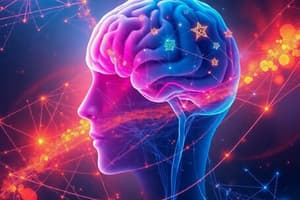Podcast
Questions and Answers
What is the formula for calculating IQ?
What is the formula for calculating IQ?
Which of the following is NOT a factor that can influence intelligence levels?
Which of the following is NOT a factor that can influence intelligence levels?
What does a mental age (MA) indicate?
What does a mental age (MA) indicate?
What IQ score range is typically considered 'normal intelligence'?
What IQ score range is typically considered 'normal intelligence'?
Signup and view all the answers
Which statement about the bell-shaped curve of IQ distribution is true?
Which statement about the bell-shaped curve of IQ distribution is true?
Signup and view all the answers
Which type of intelligence involves skills in scientific thinking and problem solving?
Which type of intelligence involves skills in scientific thinking and problem solving?
Signup and view all the answers
What aspect distinguishes intrapersonal intelligence from interpersonal intelligence?
What aspect distinguishes intrapersonal intelligence from interpersonal intelligence?
Signup and view all the answers
Howard Gardner's theory indicates that intelligence is:
Howard Gardner's theory indicates that intelligence is:
Signup and view all the answers
What does Spatial Intelligence involve?
What does Spatial Intelligence involve?
Signup and view all the answers
Which component is NOT part of componential intelligence?
Which component is NOT part of componential intelligence?
Signup and view all the answers
Which of the following best describes contextual intelligence?
Which of the following best describes contextual intelligence?
Signup and view all the answers
Which type of intelligence would best describe a poet?
Which type of intelligence would best describe a poet?
Signup and view all the answers
Which type of intelligence involves the integration of past experiences to solve novel problems?
Which type of intelligence involves the integration of past experiences to solve novel problems?
Signup and view all the answers
Individuals with strong Bodily-Kinaesthetic Intelligence are likely to excel in:
Individuals with strong Bodily-Kinaesthetic Intelligence are likely to excel in:
Signup and view all the answers
Musical Intelligence is best described as sensitivity to:
Musical Intelligence is best described as sensitivity to:
Signup and view all the answers
Which of the following is NOT an example of naturalistic intelligence?
Which of the following is NOT an example of naturalistic intelligence?
Signup and view all the answers
Who is most likely to exhibit strong interpersonal intelligence?
Who is most likely to exhibit strong interpersonal intelligence?
Signup and view all the answers
What is a common trait of individuals with Logical-Mathematical Intelligence?
What is a common trait of individuals with Logical-Mathematical Intelligence?
Signup and view all the answers
Which profession is least likely to be associated with Spatial Intelligence?
Which profession is least likely to be associated with Spatial Intelligence?
Signup and view all the answers
What is an example of experiential intelligence?
What is an example of experiential intelligence?
Signup and view all the answers
Which of the following statements about componential intelligence is true?
Which of the following statements about componential intelligence is true?
Signup and view all the answers
What is the role of arousal in intellectual activity according to the C.PASS model?
What is the role of arousal in intellectual activity according to the C.PASS model?
Signup and view all the answers
Which type of processing allows a person to remember information in a serial manner?
Which type of processing allows a person to remember information in a serial manner?
Signup and view all the answers
Planning in the context of intelligence is primarily focused on which aspect?
Planning in the context of intelligence is primarily focused on which aspect?
Signup and view all the answers
What is the age range for individuals assessed by the Cognitive Assessment System?
What is the age range for individuals assessed by the Cognitive Assessment System?
Signup and view all the answers
Which correlation value indicates the highest similarity in intelligence between identical twins reared together?
Which correlation value indicates the highest similarity in intelligence between identical twins reared together?
Signup and view all the answers
Which of the following best represents the interaction style between the three components of the C.PASS model?
Which of the following best represents the interaction style between the three components of the C.PASS model?
Signup and view all the answers
Which of the following is NOT a feature of the Cognitive Assessment System?
Which of the following is NOT a feature of the Cognitive Assessment System?
Signup and view all the answers
Children's intelligence is most closely related to which type of parental influence?
Children's intelligence is most closely related to which type of parental influence?
Signup and view all the answers
What is a feature of group intelligence tests?
What is a feature of group intelligence tests?
Signup and view all the answers
Which test type can be administered to illiterate individuals?
Which test type can be administered to illiterate individuals?
Signup and view all the answers
What is a characteristic of culture-fair tests?
What is a characteristic of culture-fair tests?
Signup and view all the answers
How might intelligence tests lead to negative outcomes for individuals?
How might intelligence tests lead to negative outcomes for individuals?
Signup and view all the answers
Which example is classified as a non-verbal test?
Which example is classified as a non-verbal test?
Signup and view all the answers
What distinguishes culture-biased tests from culture-fair tests?
What distinguishes culture-biased tests from culture-fair tests?
Signup and view all the answers
What limitation is associated with intelligence tests?
What limitation is associated with intelligence tests?
Signup and view all the answers
Who made a significant contribution to intelligence testing in Hindi?
Who made a significant contribution to intelligence testing in Hindi?
Signup and view all the answers
Which set of skills is emphasized in technologically advanced societies for child rearing?
Which set of skills is emphasized in technologically advanced societies for child rearing?
Signup and view all the answers
What aspect does Integral Intelligence in the Indian tradition prioritize?
What aspect does Integral Intelligence in the Indian tradition prioritize?
Signup and view all the answers
Which of the following skills does Buddhi, according to J.P.Das, NOT include?
Which of the following skills does Buddhi, according to J.P.Das, NOT include?
Signup and view all the answers
Emotional intelligence is defined as the ability to do what?
Emotional intelligence is defined as the ability to do what?
Signup and view all the answers
What does the Emotional Quotient (EQ) represent?
What does the Emotional Quotient (EQ) represent?
Signup and view all the answers
In less technologically developed societies, which skills are valued?
In less technologically developed societies, which skills are valued?
Signup and view all the answers
Which component is NOT part of Buddhi's definition?
Which component is NOT part of Buddhi's definition?
Signup and view all the answers
What is a key benefit of programs aimed at improving students' emotional intelligence?
What is a key benefit of programs aimed at improving students' emotional intelligence?
Signup and view all the answers
Flashcards
Multiple Intelligences
Multiple Intelligences
Theory suggesting intelligence isn't one single ability, but a collection of distinct, interacting types.
Linguistic Intelligence
Linguistic Intelligence
Ability to use language effectively, understand different meanings, and create mental language-based images.
Logical-Mathematical Intelligence
Logical-Mathematical Intelligence
Skills in logic, reasoning, and problem-solving, often involving mathematical concepts.
Spatial Intelligence
Spatial Intelligence
Signup and view all the flashcards
Musical Intelligence
Musical Intelligence
Signup and view all the flashcards
Bodily-Kinesthetic Intelligence
Bodily-Kinesthetic Intelligence
Signup and view all the flashcards
Information-Processing Approach
Information-Processing Approach
Signup and view all the flashcards
Types of Information
Types of Information
Signup and view all the flashcards
Mental Age (MA)
Mental Age (MA)
Signup and view all the flashcards
Chronological Age (CA)
Chronological Age (CA)
Signup and view all the flashcards
IQ Formula
IQ Formula
Signup and view all the flashcards
Normal Intelligence Range
Normal Intelligence Range
Signup and view all the flashcards
Intellectual Disability
Intellectual Disability
Signup and view all the flashcards
Intrapersonal Intelligence
Intrapersonal Intelligence
Signup and view all the flashcards
Interpersonal Intelligence
Interpersonal Intelligence
Signup and view all the flashcards
Naturalistic Intelligence
Naturalistic Intelligence
Signup and view all the flashcards
Componential/Analytical Intelligence
Componential/Analytical Intelligence
Signup and view all the flashcards
Knowledge Acquisition (Componential)
Knowledge Acquisition (Componential)
Signup and view all the flashcards
Experiential/Creative Intelligence
Experiential/Creative Intelligence
Signup and view all the flashcards
Contextual/Practical Intelligence
Contextual/Practical Intelligence
Signup and view all the flashcards
Triarchic Theory of Intelligence
Triarchic Theory of Intelligence
Signup and view all the flashcards
C.P.A.S.S. Model
C.P.A.S.S. Model
Signup and view all the flashcards
Arousal/Attention
Arousal/Attention
Signup and view all the flashcards
Simultaneous Processing
Simultaneous Processing
Signup and view all the flashcards
Successive Processing
Successive Processing
Signup and view all the flashcards
Planning
Planning
Signup and view all the flashcards
Cognitive Assessment System
Cognitive Assessment System
Signup and view all the flashcards
Nature vs. Nurture in Intelligence
Nature vs. Nurture in Intelligence
Signup and view all the flashcards
Correlation of Intelligence
Correlation of Intelligence
Signup and view all the flashcards
Group Intelligence Test
Group Intelligence Test
Signup and view all the flashcards
Verbal Intelligence Test
Verbal Intelligence Test
Signup and view all the flashcards
Non-Verbal Intelligence Test
Non-Verbal Intelligence Test
Signup and view all the flashcards
Performance Intelligence Test
Performance Intelligence Test
Signup and view all the flashcards
Culture-Fair Test
Culture-Fair Test
Signup and view all the flashcards
Culture-Biased Test
Culture-Biased Test
Signup and view all the flashcards
Misuses of Intelligence Tests
Misuses of Intelligence Tests
Signup and view all the flashcards
Intelligence Testing in India
Intelligence Testing in India
Signup and view all the flashcards
Integral Intelligence
Integral Intelligence
Signup and view all the flashcards
Buddhi
Buddhi
Signup and view all the flashcards
Emotional Intelligence
Emotional Intelligence
Signup and view all the flashcards
Emotional Quotient (EQ)
Emotional Quotient (EQ)
Signup and view all the flashcards
Technologically Advanced Societies' Child Rearing Practices
Technologically Advanced Societies' Child Rearing Practices
Signup and view all the flashcards
Less Technologically Developed Societies' Values
Less Technologically Developed Societies' Values
Signup and view all the flashcards
Western Intelligence Tests
Western Intelligence Tests
Signup and view all the flashcards
Collectivistic Orientation
Collectivistic Orientation
Signup and view all the flashcards
Study Notes
Individual Differences in Human Functioning
- Individual differences refer to variations in characteristics and behaviors among people.
- Situationism suggests that behaviors are significantly influenced by the surrounding environment and circumstances.
- Psychological assessment is the process of evaluating psychological attributes, abilities, behaviors, and personal qualities through systematic testing procedures.
Types of Assessment
- Formal Assessment: Standardized, objective, and organized.
- Informal Assessment: Varies per case and assessor, subjective.
Characteristics of Psychological Attributes
- Complex and multi-dimensional (cognitive, emotional, social, etc.).
Psychological Attributes: Intelligence
- Definition: Global capacity for understanding the world, rational thinking, and effective resource utilization in challenging situations.
- Use of Tests: Intelligence tests measure overall cognitive ability, including the capacity for learning from schooling.
Psychological Attributes: Aptitude
- Definition: Underlying potential for acquiring skills.
- Use of Tests: Aptitude tests predict future capabilities with proper training and environment.
Psychological Attributes: Interest
- Definition: Preference for specific activities over others.
- Use of Tests: Interest assessments help guide choices promoting life satisfaction and vocational success.
Psychological Attributes: Personality
- Definition: Relatively enduring characteristics making a person unique.
- Use of Tests: Personality assessments elucidate behaviors and predict future actions.
Psychological Attributes: Values
- Definition: Enduring beliefs about ideals for guiding behavior and judging others.
- Use of Tests: Value assessments determine dominant beliefs and principles guiding actions.
Assessment Methods
- Psychological Tests: Objective, standardized measures of mental and/or behavioral characteristics. Used for clinical diagnosis, guidance, personnel selection, placement, and training.
- Interviews: Gathering information from individuals through one-on-one interactions, used in counselling, employee selection, and other applications.
- Case Studies: In-depth examinations of individuals’ backgrounds, histories, and experiences in their environments. Utilized by clinical psychologists.
- Observations: Recording and analyzing behaviors in natural settings via organized, systematic, and objective procedures.
- Self-Reports: Method where individuals provide information about themselves and beliefs via interviews, questionnaires, psychological tests, and personal diaries.
Intelligence and Theories of Intelligence
-
Multiple definitions of intelligence exist.
-
Psychometric approach emphasizes cognitive abilities as a singular index.
-
Uni-factor theory: Intelligence is a single trait.
-
Two-factor theory: Includes a general factor (g) and specific factors (s.)
-
Theory of Primary Mental Abilities: Proposes 7 independent primary abilities.
-
Hierarchical Model of Intelligence: Suggests intelligence operates at multiple levels.
-
Structure of Intellect Model: Classifies intellectual traits across operations, contents, and products.
-
Information-Processing Approach: Explains how individuals use cognitive processes for problem-solving and reasoning.
-
Theory of Multiple Intelligences: Postulates several distinct types of intelligence, independent of each other (linguistic, logical-mathematical, spatial, musical, bodily-kinesthetic, intrapersonal, interpersonal, and naturalistic.)
-
Triarchic Theory of Intelligence: Views intelligence as comprised of componential, experiential, and contextual elements, emphasizing adaptability and contextual factors in intelligence.
-
PASS Model of Intelligence: Suggests interdependent neurological systems (arousal/attention, simultaneous/successive processing) are fundamental to intellectual activity.
Intelligence: Nature vs. Nurture
- Correlations highlight the interplay of genetic predispositions (nature) and environmental influences (nurture) in shaping intelligence.
- Twin and sibling studies reveal heritability influence on intelligence, although environmental factors still play a significant role.
Assessment of Intelligence
- Development of standardized IQ tests, and methods of determining mental age.
- Typical IQ distributions and understanding of normal vs. exceptional intelligence and intellectual disability.
Culture and Intelligence
- Cultures vary in values, and these values inform societal expectations and performance assessments.
- Vygotsky's theory highlight cultural contexts as foundational for intellectual development.
Creativity and Intelligence
- Creativity is the capacity to generate novel ideas, objects, or problem solutions.
- Some studies suggest limited correlation between intelligence and creativity.
Types of Intelligence Tests
- Individual tests: Administered to one person with an emphasis on rapport-building.
- Group tests: Administered to multiple persons simultaneously.
- Verbal tests: Require oral or written responses.
- Nonverbal tests: Employ illustrations or visuals.
- Performance tests: Require manipulation of objects to assess skills and abilities.
- Culture-fair tests: Designed to avoid bias toward specific cultural groups.
- Culture-biased tests: Reflect characteristics of particular cultural contexts..
Studying That Suits You
Use AI to generate personalized quizzes and flashcards to suit your learning preferences.
Related Documents
Description
This quiz explores individual differences in human functioning and the impact of situationism on behavior. It also covers the types of psychological assessments and characteristics of psychological attributes, with a focus on intelligence assessment. Test your understanding of these key concepts in psychology.




